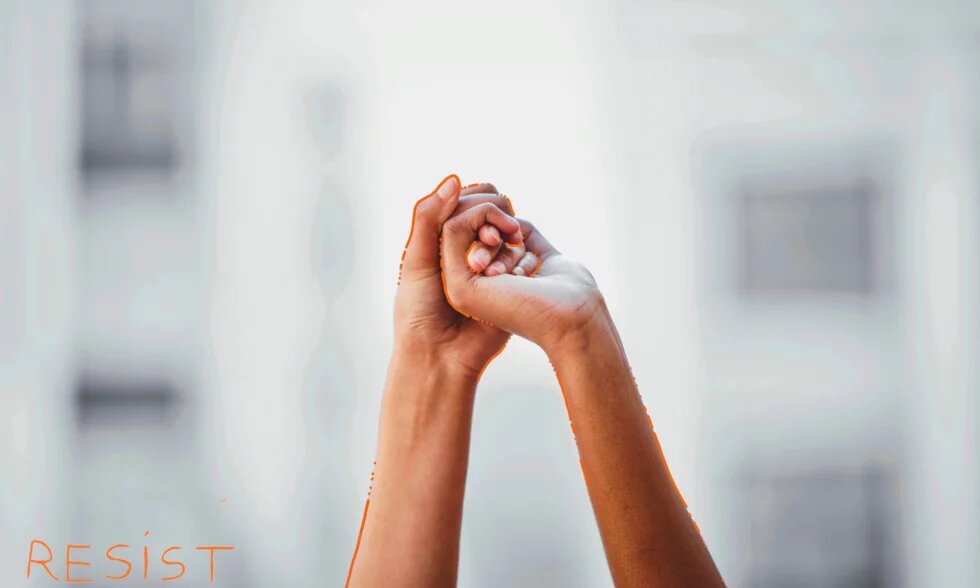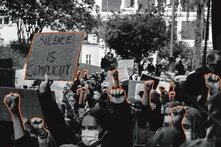What does it mean to be a feminist activist in El Salvador? In midst of criminalization of protests, police persecution, discrimination, and lack of freedom of expression, feminist activists in El Salvador take their fight to the streets.

El Salvador has become an inhospitable place for human rights defenders, including activists and leaders of the feminist movement. The government led by Nayib Bukele has criminalized marches and protests, and the fear of being imprisoned for criticizing the government is increasing. Added to this is the passage of the Foreign Agents Law, which imposes a 30 percent tax on nongovernmental organizations, which will eventually force many to cease operations. In this context, the voices of feminist organizations face police persecution, lack of opportunities, and zero freedom of expression. We spoke with Keyla Cáceres and Patricia (a pseudonym), two activists who faced persecution and surveillance due to their role in the feminist movement.
Authoritarian shift and the criminalization of feminist activism
First, however, we must understand how El Salvador became such a dangerous place for human rights defenders. President Nayib Bukele came to power in 2019. In 2021, his Nuevas Ideas party won a supermajority in the Legislative Assembly. Fifty-six representatives were at his disposal to pass laws without any political counterweight. In their first plenary session, they dismantled the third branch of government: the judiciary. They removed the Supreme Court justices and the Attorney General and replaced them with pro-government allies. In March 2022, amid a surge in gang violence and with control of all three branches of government, the ruling party imposed a state of emergency that includes the suspension of rights such as the right to defense and freedom of association. It has allowed for mass arrests, including not only gang members but also civilians, political opponents, activists, and critics of the regime.
El Salvador has historically been a religious and conservative country. Being a feminist here has never been easy, but in the Bukele era, it has become significantly worse.
El Salvador's feminist movement emerged in the early 90’s, with the end of the civil war and the signing of the peace accords that marked the end of the dictatorship and ushered in democracy. In 2025, in a new authoritarian decline, the Salvadoran feminist movement is at risk. Throughout his term, the president has spoken out against feminist organizations in his public speeches and on his “X” account, generating waves of hateful comments from his followers towards feminist activists. El Salvador has historically been a religious and conservative country. Being a feminist here has never been easy, but in the Bukele era, it has become significantly worse. Feminist organizations face the criminalization of protest with an unconstitutionally reelected president.
For more than three decades, the feminist movement in El Salvador has called for protests and mobilization to raise awareness of various social issues such as violence against women, femicides, the disappearance of persons, and environmental issues. Salvadoran feminists have also protested against the dismissal of Supreme Court justices in 2022, the approval of the state of emergency, and the arbitrary arrests carried out by the National Civil Police. Thus, a Salvadoran feminist march carries a strong political charge that is intersectional and touches on different aspects of how women are vulnerable in an oppressive state.
Standing up for women's rights, exposed to insufficient human rights
For all the above reasons, being a feminist leader can make you a target. In 2024, Verónica and Dina, two feminist leaders, were imprisoned after participating in the International Women’s Day march. These events forced feminist activists to lower their profile or take security measures in case of possible capture. Verónica and Dina were key members of social organizations like Alerta Raquel, a group of women, mostly mothers of missing persons, who seek to raise awareness about the issue of missing people in El Salvador.
Patricia, a fictitious name for security reasons, is a spokesperson for the Ixchel Collective, an organization that supports various social struggles. She was one of the activists who supported Verónica’s and Dina's families while they were deprived of their liberty. Dina was 38 weeks pregnant, almost nine months, when she was captured and suffered a miscarriage while in state custody.
The Salvadoran state, known for its absolute ban on abortion and criminalization of women who have suffered obstetric emergencies, failed to guarantee the conditions for Dina's pregnancy to reach term. Besides, Patricia commented that supporting Dina’s family during this process was difficult due to the constant police harassment they suffered.
Dina was deprived of her liberty from March to December 2024. She played a key role as the co-founder of Alerta Raquel. For Patricia, reporting these types of cases was what put Dina in the authorities' sights. “The issue of disappearances is an extremely uncomfortable topic for the government because it counters the narrative that there is no longer violence in El Salvador, but for 10 years, you have a lot of mothers searching for their children in cases where there is still no access to the truth,” she commented.
Feminist activists face growing pressure under state measures
In November 2024, feminist organizations were preparing for the march to commemorate the International Day for the Elimination of Violence against Women. Keyla Cáceres is an activist and member of the Feminist Assembly, the organization that led this march. Prior to the mobilization, two organizations identified police presence outside their offices which they considered intimidation. Keyla faced police persecution before and after the march on 25 November. In early November 2024, she went to a radio station to talk about the march. As she was leaving the venue, while driving, a truck stopped next to her, and an unknown man shouted from the vehicle that he heard her on the radio and that there were things she had not finished saying, implying that Keyla had self-censored. In that interview, Keyla had spoken about gender-based violence in El Salvador. She explained the setbacks in women's rights that occurred during the Bukele administration. That event was her first warning sign.
During the march, she was in charge of shouting slogans into the microphone. She was one of the most visible faces of the protest. Two days later, a police patrol intercepted her outside her workplace. "There were four officers, all four wearing balaclavas and police uniforms, but none of them had their ID numbers visible as usual," she said. They told her they were conducting a census of organizations and wanted her ID. She told them they needed a court order for that. One of the officers told her: "We can do this by fair means or foul." She decided to go into the office and not give them any information. After that, Keyla received at least one more instance of surveillance, this time around her home. She has been an activist for more than 11 years and asserts that, since the 80’s, defending human rights in El Salvador has never been more dangerous than now. "I think this is one of the worst times ever, due to the fear and self-censorship that can exist within organizations," she said.
These incidents led to the loss of her job, as agents were guarding the perimeter of her workplace and she decided to resign. Six months after this incident, Keyla lamented that the activists' employment situation is getting worse. In May 2025, the Nayib Bukele government approved the Foreign Agents Law, a law that imposes a 30 percent tax on social organizations and requires them to register with a government agency, where the government itself will decide whether they can operate. When asked about this law, Patricia stated that she believes her organization will only be able to operate until the end of 2025, meaning that many women human rights defenders will lose their jobs.
Mobilization continues despite restrictions
Despite the current context, feminist activists are seeking new strategies to work in their communities, even if their work must remain low-key. Organizations like Colectiva Ixchel continue to create spaces to discuss sexual dissidence, women's rights, and self-care. Other feminist collectives are also preparing for the Pride march, which will take place in El Salvador on 28 June 2025. This march is a historically important event for bisexual, lesbian, and trans women who demand better living conditions from the state. For now, there is uncertainty in El Salvador; there are rumors that this mobilization may be the last of its kind. Despite this, the feminist movement will once again take to the streets of San Salvador.

